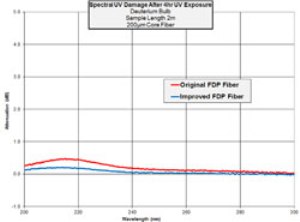Sep 11 2013
Polymicro Technologies, a subsidiary of Molex Incorporated, recently announced improvements to its FDP optical fiber. The latest enhancements improve solarization of the fiber in deep UV applications (190 – 325 nm).
 FDP optical fiber attenuation chart
FDP optical fiber attenuation chart
“The introduction of fiber FDP revolutionized UV applications. We are pleased to bring customers enhanced FDP fiber with even better qualities to withstand UV exposure,” states Teodor Tichindelean, global product manager, Polymicro Technologies.
Polymicro silica core optical FDP fiber features ultra high UV transmission and ultra low UV solarization, with superior radiation resistance. Operating down to 190 nm with excellent deep UV solarization resistance characteristics, FDP fiber has become a fiber of choice for applications in the deep UV region. The new FDP fiber delivers greater solarization resistance to sustain transmission longer, while minimizing damage to the fiber.
For applications in the deep UV region, the effects of high levels of UV radiation cause fiber and transmission deterioration. Fibers typically lose transmission after several hours. “Improved FDP fiber offers approximate 10 percent more light output after initial degradation compared with the previous version,” adds Tichindelean. “For Polymicro customers, that translates to better light emission and longer product life.”
Delivering dimensional control and tight tolerances, Polymicro FDP optical fibers offer a range of options, including custom core sizes, coatings, buffers and assemblies. Molex and Polymicro facilities are ISO 9001, 13485 and 14001 certified. For more information about Polymicro solutions please visit www.polymicro.com. To receive information on other Molex products and industry solutions, please sign up for our e-nouncement newsletter at www.molex.com/link/register.
About Molex Incorporated
Providing more than connectors, Molex delivers complete interconnect solutions for a number of markets including: data communications, telecommunications, consumer electronics, industrial, automotive, commercial vehicle, aerospace and defense, medical, and lighting. Established in 1938, the company operates 41 manufacturing locations in 15 countries. The Molex website is http://www.molex.com. Follow us at www.twitter.com/molexconnectors, watch our videos at www.youtube.com/molexconnectors, connect with us at www.facebook.com/molexconnectors and read our blog at www.connector.com.